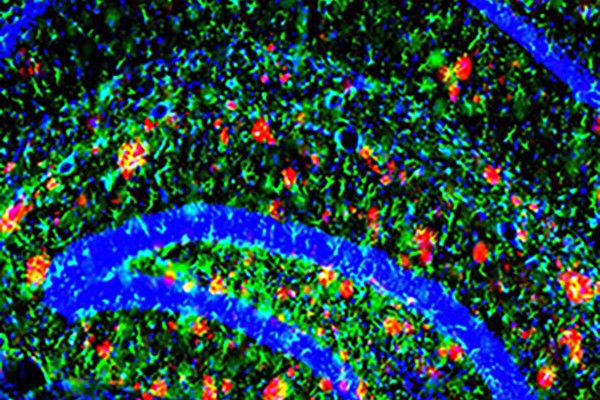Brain’s ability to dispose of key Alzheimer’s protein drops dramatically with age
The greatest risk factor for Alzheimer’s disease is advancing age. Researchers at Washington University School of Medicine in St. Louis have identified some of the key changes in the aging brain that lead to the increased risk. The changes center on amyloid beta 42,
a main ingredient of Alzheimer’s brain plaques.
Bateman receives MetLife Award for Alzheimer’s research
Randall J. Bateman, MD, the Charles F. and Joanne
Knight Distinguished Professor of Neurology at the
School of Medicine, has received a MetLife Foundation Award
for Medical Research. Bateman, a leader in Alzheimer’s disease research, is the university’s fifth researcher to receive the prize.
Alzheimer’s research, need for funding highlighted during Blunt visit
U.S. Sen. Roy Blunt, R-Mo., visited the Medical Campus this week to meet with physicians who treat patients with Alzheimer’s disease, and patients and caregivers who live with the debilitating disease every day. Blunt, pictured with physician-scientist Randall J. Bateman, chairs a subcommittee that oversees funding for medical research.
Holtzman, Bateman win Chancellor’s Innovation Award
David M. Holtzman, MD, and Randall J. Bateman, MD, have been chosen as co-recipients of the Chancellor’s Award for Innovation and Entrepreneurship at Washington University in St. Louis.
Investigational drugs chosen for major Alzheimer’s prevention trial
Leading scientists have selected the first drugs to
be evaluated in a worldwide clinical trial to determine whether they can
prevent Alzheimer’s disease. The pioneering trial, expected to
start by early 2013, initially will test three promising drugs, each
designed to target Alzheimer’s in different ways.
First detailed timeline established for brain’s descent into Alzheimer’s
Scientists have assembled the most detailed chronology
to date of the human brain’s long, slow slide into full-blown
Alzheimer’s disease. Through an international research partnership known as
the Dominantly Inherited Alzheimer’s Network (DIAN), scientists at
Washington University and elsewhere evaluated pre-symptomatic markers of Alzheimer’s disease in subjects from
families genetically predisposed to develop the disorder.
Marker for Alzheimer’s disease rises during day, falls with sleep
A marker for Alzheimer’s disease rises and falls in the spinal fluid in a daily pattern that echoes the sleep cycle, researchers at Washington University School of Medicine in St. Louis have found. The pattern is strongest in healthy young people and reinforces a link between increased Alzheimer’s risk and inadequate sleep that had been discovered in animal models.
Alzheimer’s patients can’t effectively clear sticky plaque component
Neurologists finally have an answer to one of the most important questions about Alzheimer’s disease: Do rising brain levels of a plaque-forming substance mean patients are making more of it or that they can no longer clear it from their brains as effectively? A new study by Randall Bateman, MD, assistant professor of neurology, shows clearance is impaired in Alzheimer’s patients.


